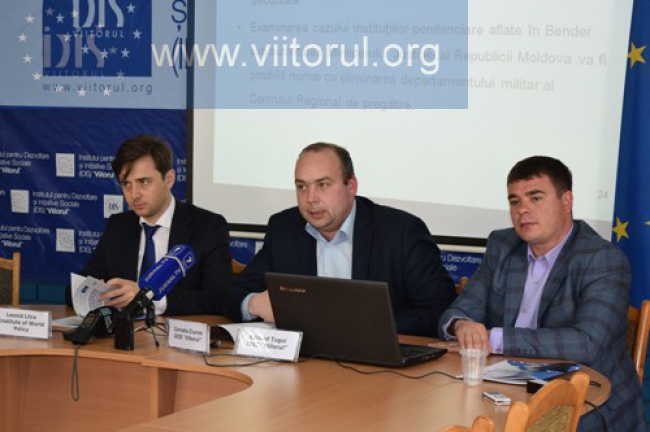On the 29th of April the study “The reform of the peacekeeping mission in Transnistria: a premise for conflict settlement” was presented in Chisinau (Kishinev).The study was developed by the Institute of World Policy and IDIS “Viitorul” (Republic of Moldova) with the financial support of the German Marshall Fund.
The authors Corneliu Ciurea, Alyona Getmanchuk, Leonid Litra, Eduard Tugui examined the role of the peacekeeping mission in Transnistria and its evolution over the 22 years. Experts also analyze several scenarios of reforming it in the context of events happening in Ukraine and their impact on Moldova.
{1}
According to the IDIS expert, Eduard Tugui while the EU and other international actors have developed peacekeeping missions that focus on crisis management, strengthening of the rule of law, civilian administration and civil protection, while the Russian peacekeeping mission model is peculiar with its hard security, and Russia uses it as a mechanism for legitimizing its military presence in the post-Soviet space.
The peacekeeping mission in Transnistria had a positive role when it was established. However, along with the changes in the region and in the conflict settlement process, the current mission no longer corresponds with the current needs. Already 22 years passed and the mission did not develop from a provisional mechanism designed to stop hostilities to a mission designed to create confidence in the process of conflict settlement and rapprochement between the two banks. Therefore, the current peacekeeping has to be transformed into an international civil monitoring mission, which would have a clear mandate, concrete tasks, impartial and would be in line with the UN standards, stated Leonid Litra.
{2}
However, the transforming the current mission into an efficient international peacekeeping mission is not an easy task due to the changes in the area and a shaky status quo, as well as the unwillingness of Russia to accept it. That is why the situation will change, and several scenarios are possible. The most positive is the one in which parties agree to reform the mission. A process of reform would entail a rethinking of the decision-making process within the Joint Control Commission and a mechanism of rotation of senior officials as well as a mission that would be more focused on law enforcement and ensuring that human rights, including the free movement, are respected, explained Corneliu Ciurea.
The full text of the analytical paper in Ukrainian is here, аnd in English here.
The study will be further presented publicly in Kiev and Brussels.




Comments theme
Comments themeComments themeComments themeComments themeComments themeComments themeComments themeComments themeComments themeComments themeComments themeComments themeComments themeComments themeComments themeComments themeComments themeComments themeComments themeComments.